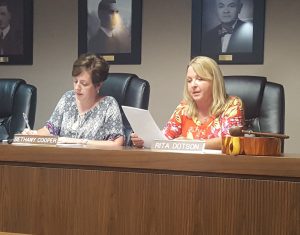
The City of Benton is taking steps to tackle a problem in its wastewater filtration beds.
Benton City Council on Wednesday voted to initiate steps to remove sludge buildup from the first of three filtration beds. Algae and plant life that grow along the bottom of the stabilization pond and form sludge have steadily washed into the filtration beds to the point of capacity, preventing proper reduction of nitrogen and microorganisms in treatment.
“It should have never left the pond,” said Benton Wastewater Supervisor Harold Helton. “What happened (was) the put the new aeration in the pond – the state required them I guess to put those big 20-horse brush aerators – and they’re mixer aerators. And they’re made for actually catfish ponds – something that’s 10-12 feet deep. Which, our pond is 5 feet deep. It’s 16 surface acres, but it’s only 5 feet deep. And those big aerator mixers, mixed it so much that it just suspended it all in the water and moved it to a different part of the plant.”
Phragmites – a reed plant that grows in wetland areas – that had gone unchecked for too long contributed to the issue as well, Helton said. The reeds beds should have been burned at least once a year, he said, but had been allowed to grow prior to his time in the department.
“All that dead foliage would just fall off into the bed, and now it’s 2 feet deep,” Helton said. “It’s taking up all my volume. If it weren’t for that, we’d still be all right for a few years.”
Mayor Rita Dotson said she had worked with Rivercrest Engineering to define a plan of approach and bid the removal project. Dotson said Rivercrest consultant Charles McCann determined that sludge removal would be considerably less costly to bid the project out by hourly rate for equipment and operators rather than the job as a whole.
“It’s going to be a job, we decided that, if we got a contractor when they had some down time they wouldn’t charge us as much than if we said, ‘Come in and do this job right now and this is what we want you to bid it on,’” Dotson said. “So we bid it at the hourly rate so that when they’re not as busy, they can pop in and work on those sludge beds.”
Even still, it’s a costly process. Dotson said the city intended to look at best options with the contractor to remove the sludge, including possible plans to remove water from the sludge to cut down on costs of hauling the material to the dump. Regardless, Dotson estimated the project could cost anywhere from $75,000 to $100,000 per bed, depending on the number of man hours put in on the project. Dotson said the city would have to take the removal project on one bed at a time throughout the course of the next few years.
The council awarded the bid to Greer Excavating in Calvert City. The company proposed hourly rates of $58.42 for equipment operator, and $43.13 for driver hauling a roll off truck; equipment rates were: standard trackhoe (31-foot), $150; and long-reach trackhoe (60-foot), $175.
City Treasurer and Clerk Bethany Cooper said the city had about $61,000 to put toward the first removal project between the sewer maintenance and wastewater treatment accounts, plus a steady $3,000 monthly deposit that fed into the sewer maintenance account. The council approved remaining funds to come from the water account, if necessary. The account had initially been part of the wastewater account, however Dotson said the council voted about six months ago to separate the two. Dotson estimated funds transferred from water to assist with the project could range anywhere from $10,000 to $30,000, if it was necessary at all.
The city intends to explore preventative measures on sludge buildup in the future, including replacing aerator systems.
In other business, the council:
- Approved a $2,500 donation to the Children’s Art Center;
- voted to allow City Hall to be used as a venue for this year’s Progressive Dinner; and
- read a resolution declaring September “City Government Month,” during which the city will promote civics education in elementary schools.
